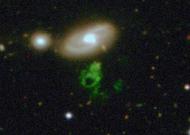

Galaxy Zoo Produces a Rare Specimen 188
We discussed the Galaxy Zoo project soon after it launched last summer. Science News is now following developments about an odd celestial object
that is fueling a lot of excitement among astronomers around the world. In August, a Dutch schoolteacher named Hanny, in the process of characterizing galaxy images, noticed a peculiar object and posted a query about it on the Galaxy Zoo blog. She called it a "Voorwerp," which Science News says is Dutch for "thing" but which Google translates as "subject." Hanny's Voorwerp emits mostly green light (the earlier report said blue). The best guess astronomers have now is that the Voorwerp is emitting "ghost light," i.e. it is "lit by the ultraviolet light and X-rays from a quasar that has vanished in the last 100,000 years," to quote astronomer Bill Keel. "As far as we can tell, it's an unprecedented thing," Keel added. Researchers are scrambling to book time on the Hubble and other major telescopes to get a closer look.




Re:image in the post? (Score:5, Interesting)
I was thinking exactly the same thing.
I've been reading this site since 2000 and I can't recall *ever* seeing an image on the front page, I don't even think there was one for that monster thread about 9/11 as it unfolded...
Green, Blue? (Score:5, Interesting)
How far away is this 'thing' and what sort of red shift should we be factoring into its true color?
Once that has been answerd, what sorts of atoms would emit that wavelength when excited by a radiation source?
Re:Zoo (Score:4, Interesting)
Dutch != Deutsch == German
The proper Dutch translation would be:
Voorwerp niet voeren!
Or, the Dutch funny edition:
Niet voeren da Voorwerp!
Or, the Anglo-Dutch funny edition:
Niet food'n da Voorwerp!
Not always a 1:1 translation (Score:5, Interesting)
I grew up in South Africa, speaking mainly English, but also Afrikaans (a derivative of Dutch) and Zulu. My father and I would often mix all three in one sentence to get the words we wanted.
To answer, "Why the rush?" (Score:5, Interesting)
Folks ask, "Why the rush?" to get time on the Hubble and other instruments.
Simply put, astronomical events can be extremely short lived. Yes, it happened millions of years ago. And it could continue for millions of years. But just as it appeared, it could go out.
Think what happens to novas and super novas. They blink into existence and then disappear. The same could happen here. Having never seen this class of voorwerp (object, thing, etc.), it is possible it could go out tomorrow or change dramatically in way which would make baseline data of the current status incredibly valuable.
Going a bit off topic here, I have to say it is totally cool to see a reference to my old friend and fellow Geek, Bill Keel here on Slashdot.
Bill and I attended UC Santa Cruz in the 1980s. I entered as a Freshman while Bill was finishing up his Phd in Astronomy (by the way, UC Santa has the top graduate program in Astronomy).
Even then he was the galaxy nerd and his dissertation was on the topic of, if I remember correctly, formation of spiral galaxies. I remember helping him with nroff and troff as he put his dissertation together.
During his Post-Doc years, he would come back frequently to perform observations at Lick Observatory (above San Jose) and to crunch data using a program written in Forth that ran on a handful of systems in the world (one of which was at UCSC).
Our friendship continued over the years (I was even one of his groomsmen).
Bill is a passionate teacher and researcher. He is very supportive of amateur astronomy (one of the few fields left where a non-professional, non-academic can have a major impact).
If you want to learn more about galaxies, check out one of his many web pages here: http://www.astr.ua.edu/keel/galaxies/ [ua.edu].